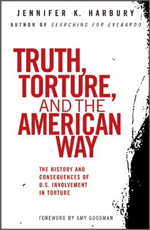Jennifer K. Harbury got her law degree at Harvard. She has lived and worked with human rights activists, peasants, and Mayan villagers in Guatemala. She currently directs the STOP (Stop Torture Permanently) Campaign at the Unitarian Universalist Service Committee. Her investigation into this growing violation of human rights began when her husband, a resistance leader, disappeared in Guatemala in 1992. Harbury told the story of his torture and murder in her books Searching for Everardo and Bridge of Courage.
In this new hard-hitting paperback, the author presents an overview of the moral and legal issues surrounding torture. Following the trail of the Abu Ghraib scandal and the reports of detainee mistreatment at Guantanamo Bay, she calls for a global movement to stop torture.
Torture has been abhorrent in this country since the framing of the Constitution and is prohibited by our domestic laws and treaties. But that did not stop the White House counsel in the Bush Administration, who has since been promoted to Attorney General, Alberto Gonzales, from issuing a memo authorizing torture and declaring the Geneva Conventions (which prohibit the torture of any prisoner, whether a formal prisoner of war, a saboteur, or a resistant leader of an internal conflict) to be "quaint" and obsolete.
Harbury gives detailed accounts of recent human rights violations, including the prisoner massacre of Konduz, Afghanistan; the terrible treatment of John Walker Lindh; and the harassment of Maher Ara, a Canadian citizen of Syrian birth. While many have been shocked by the instruments of torture used recently on prisoners to extract information, serious students of history know that the CIA has used these methods for years — in Vietnam and through the Dirty Wars in Latin America in the 1980s and 1990s. Harbury charts the U.S. role in the internal conflicts of Guatemala, El Salvador, and Honduras and gives ample space to the account of her torture by Sister Dianna Ortiz, whose book The Blindfold's Eyes: My Journey from Torture to Truth received a Spirituality and Health award in 2004.
In the closing pages, the author discusses ways in which civil, criminal and international law can be used to protect detainees from torture. Go to www.uusc.org/programs/STOP/ for more information about this organization and for suggestions of what you can do.
